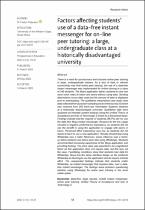factors affecting students
Abstract
There is a need for synchronous and inclusive online peer tutoring in large, undergraduate classes. As a lack of data or internet connectivity may limit online peer tutoring, the use of a data-free instant messenger was implemented for online tutoring in a class of 342 students. The Moya application allows students to chat and send voice notes to tutors and peers without using data. Sending attachments incurs data costs but the amount of data is displayed prior to downloading. The qualitative interpretivist case study used data collected from purposive sampling via an online survey. Consent was received from 252 third-year Information Systems students at a historically disadvantaged university. Qualitative data were analysed via thematic content analysis using the Unified Theory of Acceptance and Use of Technology 2 model as a theoretical basis. Findings indicate that the majority of students (85.7%) did not use the data-free Moya instant messenger.

